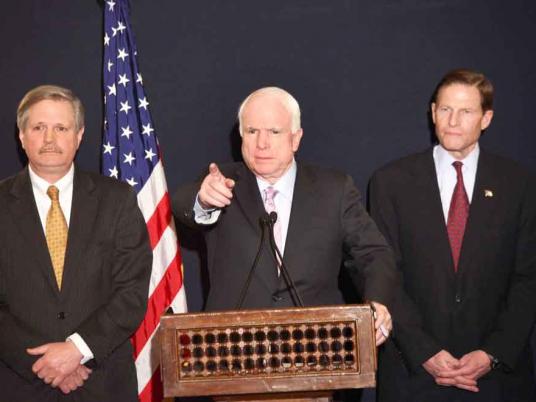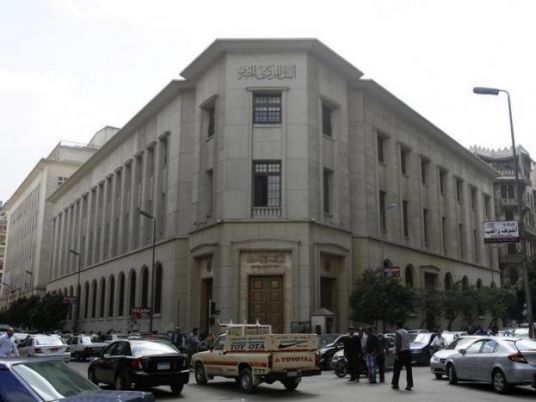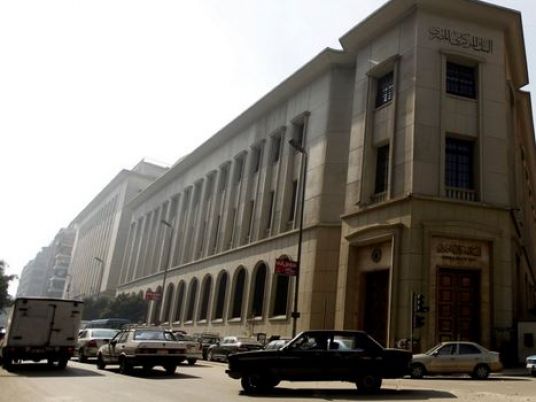When 25 January came last year, I woke early and was set to join some one of the marches, knowing that they would end in Tahrir Square. I went to the Abu al-Reesh Hospital, where organizers had told me a march would start … nothing. I took a cab around parts of Old Cairo looking for any sign of protest or marching, as the cab driver looked at me, amused.
About two hours later, things changed as I was making my way to Dokki across Galaa Bridge with my colleague Louise Sarant. Abnormally placed police cordons aside, Cairo was calm, Zamalek was calmer and everything seemed pleasant. The weather was great. On the other side of the Galaa Bridge, standing on the eponymous square, I felt the ground begin to rumble. In less than a minute, an army of about 10,000 people came marching down Tahrir Street, effortlessly making their way through the two-line-deep Central Security cordon blocking the bridge and Tahrir Square.
I thought, “Wow, Interior Minister Habib al-Adly might actually be sacked after today.” I was shortsighted.
But three people I met in the following hours helped me realize this was the beginning of something much bigger:
Islam
While crossing the bridge, I snapped out of my enchantment and thought I’d do some work. I interviewed one of the more zealous protesters: a 19-year-old college student named Islam. There didn’t seem to be anything special about him. He was an average middle-class kid. He happened to be a member of the April 6 Youth Movement, but that didn’t matter. I asked him what he was protesting for.
"I’m out here with everyone else to try and put an end to the repression that Egypt has suffered for the past 30 years. Police are guilty of torturing, imprisoning, detaining and spying on whoever they felt like. This needs to end. The entire Interior Ministry needs to be removed. I’m out here for our dignity … oh, and we’re going to take down Hosni Mubarak," he said.
At first, I didn’t believe Islam. He was impulsive-looking. But as he walked away, Islam and thousands around him chanted at the top of their lungs, “Down with Hosni Mubarak!” It was the first time I heard that phrase chanted so openly and loudly. It shook me. And I began to believe.
Later that night, Islam and his friends put up the first tent I saw in the square, which was very symbolic, because for the past year, he has been a constant fixture at every major revolutionary event. He was next to me while hails of rocks and Molotov cocktails were raining on us in Abbasseya Square in August. Again, I saw him consoling the families in the Coptic Hospital after the Maspero massacre. Since day one, I saw him as a symbol of “the youth’s” vision — and he has proven me right.
The guy on the water cannon
Once inside Tahrir, I was wondering what the security forces would hit us with first. The water cannons stood by looking like they were waiting to be used. On my way in, I jokingly told one of its operators, “Don’t be a jerk and spray us!” Little did I know that it was the first thing they would use. One cannon-carrying truck drove close by our group of protesters and began spraying. Louise and I took to the curb, and I personally didn’t mind the refreshment. A minute later, however, another cannon drove right through our crowd, and we ran for cover, trying not to get hit by the vehicle, and trying to keep from tripping anyone else, or tripping ourselves. By the time I looked up, I saw a scene that had me completely dumbfounded; one of the protesters climbed on top of the cannon and was wrestling with the fireman spraying us. They tussled on the moving truck until they both fell over its side. This is the kind of bravery that only existed in battlefields, to my limited knowledge, and that act was the first time I understood that what was about to happen in Egypt would include the kind of courage and sacrifice I had not seen on such a scale before. I don’t know what happened to that guy, and I have no clue what he even looks like. But in my mind he was the precursor to countless other acts of selfless courage that were necessary for the revolution to take off.
Essam
After a few more bouts of water cannons and tear gas, we had a few quiet hours in the square. People were talking. Was this the beginning of a Tunisia-like revolution? Many began to chant, “The people want to bring down the regime.” Everyone was buzzing. The space turned into an open forum for free thought.
To me, one man stood out.
“No! This cannot be just about police! Everything has to change. We are not living in this country. We are all living dead. I have not been alive for at least 10 years!” said Essam, a 70-year-old retired military employee. He was screaming at the top of his lungs to anybody who would listen. Essam was wearing a training suit ready to march, ready for anything. He could not believe he could finally air all his grievances as loudly as possible.
“Even before retiring, I could barely afford to provide my family with anything. I lived an indebted man. Do you know what it’s like to always be in debt? It is torture. It is like the system made sure that I always lived half a man. I just want this to change. I suffered to provide for my family and I still can’t really provide for them. Since being forced to retire at 60, I’ve had to work two jobs along with the shitty pension I received every month. After years of serving this country, I still have to pay bribes to scum at government offices to provide for the smallest necessities in life. I don’t care if I die now. This has to be a revolution! I am not leaving here until things change!”
After five minutes of yelling into space and into the crowd around him, Essam collapsed. He fell back onto the ground like a plank. There was nothing left in him. He had let it all out. Dozens of people around him tried to help him, half of them crying, touched by the scene. I had not fully comprehended what was hidden beneath the increasingly agitated masses, going through life wondering if everything was always meant to be this hard, if the God-like forces keeping them in this state could ever be defeated.
The second Essam felt empowered by the masses around him who shared his desire for change, he felt safe. He felt, even for a moment, that a burden had been lifted. Anyone who felt the same as Essam that day for even a fraction of a second knew that what was beginning to happen was special, and that the moment we were all living on the square in Tahrir must continue.




